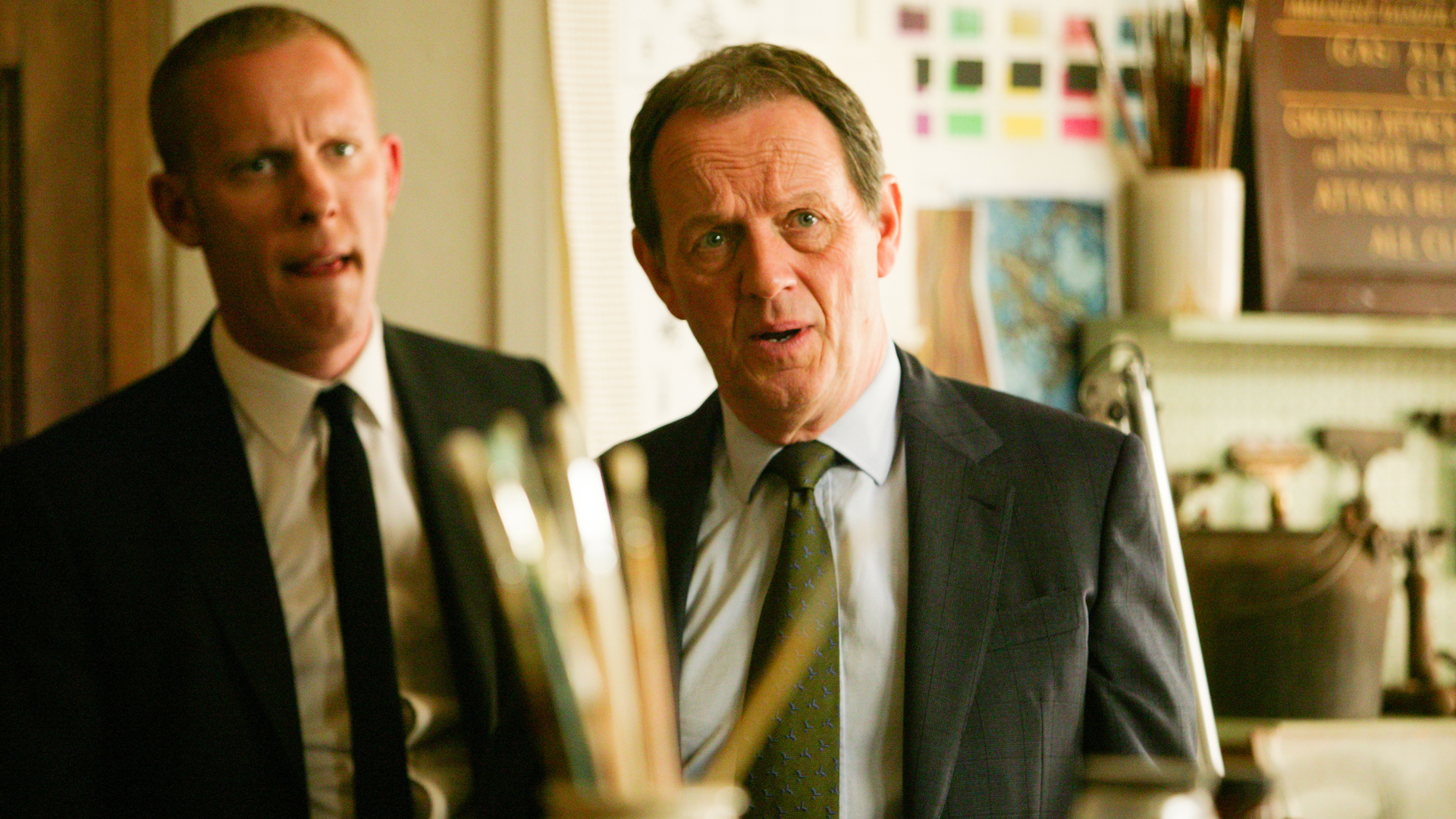 My review of last week's episode: The Lions of Nemea
My review of last week's episode: The Lions of NemeaNeed a MacGuffin to inject drama into your season finale? Add a serial killer with a grudge against your hero!
Let's
face it, the story is pretty clichéd, but psychopaths have a way of upping the
tension in any story, and it's no different in Beyond Good and Evil.
Graham
Lawrie, a Scotsman with a rictus of a face, has been in prison for thirteen
years. A newly minted Inspector Robbie Lewis put him away in 2001 for allegedly
murdering three policeman with a hammer. Now, fresh evidence has cast the
verdict into question, and another murder with an identical method adds further
force to Lawrie's appeal.
 |
| Lewis and Hathaway in that one episode where he had hair |
The
episode utilizes the Nietzsche angle but doesn't overplay
it, effectively exploring how an
intelligent psychopath plays with the minds of those around him. Alec Newman
makes a suitably chilling Lawrie, slinking about wearing a charmingly reptilian
grin, listening to Wagner (wait, what?) and threatening to make Lewis's life miserable.
This
episode is difficult to rate. For most of the time, it holds its own, building
a plot on two principles that left the audience uncertain. The first of these
is a major rule of detective fiction: first person accused din't do it.
Therefore there's a real doubt about whether our hero may've got it wrong.
Adding to this is the second principle: our hero is fast becoming a sidekick
once again.
Now, Hathaway
taking the reins is a big positive in my humble opinion. Laurence Fox brings an
intensity and intelligence to the leading role that Kevin Whately (bless his
'art) has never managed. The new relationship also creates a strong tension.
Lewis is determined to prove Lawrie guilty, even if evidence springs up to
contradict him. Hathaway is determined to be fair to all involved, and he can’t
just chuck out evidence because of Lewis’s hunch. And Hathaway’s right.
Unfortunately,
both these elements are rather canceled out in a cop-out finale that
substitutes a barely believable, uninteresting solution for what could have
been a remarkably clever crime. The issue of whether Lewis bungled the case
falls by the wayside as Hathaway, for no reason whatsoever, credits Lewis’s
advice for helping solve the case. A dramatic event halfway through the story
doesn’t take it all the way, and the characters’ reactions to it are way too
mellow. (SPOILER: When a police officer is attacked, a fellow officer—even
someone as Foyle-ish as Hathaway—would fly off the handle if some snot-nosed
kid takes that lightly.)
But it’s
not all bad. It can’t decide if it’s a thriller or not (ending says not), but
when it’s forcing Lewis to break the rules, and Hathaway to contradict his
mentor, it provides some genuine thrills and uncertainty. That’s more than we
usually see from this show. I'm beginning to like Lizzie, though she's little more than a plot point in this episode.
Should
there be another season? Yes. But it should be called Inspector Hathaway.
My review of the next season.
My review of the next season.
3.5/5 stars
Hannah Long


They only have one series of the reboot under their belts--I can't see them changing things up anytime soon. Besides, I don't think that Laurence Fox is interested in his own series at this point. Perhaps when he is older and he has gotten all his other projects out of the way. Like his music career. I think his biggest fear is that once it becomes "Inspector Hathaway" he have to commit to a decade of working on it or it will be seen as a failure next to Morse and Lewis.
ReplyDeleteI can't see them doing it either. But I definitely could see him pulling it off.
DeleteUnfortunately, both these elements are rather canceled out in a cop-out finale that substitutes a barely believable, uninteresting solution for what could have been a remarkably clever crime.
ReplyDeleteWhat is your proposed ending then? Making the college student/Nietzschean zealot the killer would have been even more trite. Having it turn out to be one of the other suspects would have been even less believable--especially the psychiatrist. The prison guard? Nah. Now, one that would floor me would be Chief Superintendent Jean Innocent. I'd never see that coming.
I'm not exactly sure how I would've written it, but I was hoping that a) Lawrie didn't do it, because that would be really interesting - and b) the person that did do it was just as big a threat as he was supposed to be. In other words, I was hoping there was some plot afoot, and that the crimes weren't random. It turned out the killer was motivated by obsessive and rather pathetic love - she wanted to impress Lawrie. That had neither the menace nor the cleverness to live up to the threat posed throughout the story. What I wanted was a serial killer - what I got was a frumpy bookbinder.
DeleteTo be fair, however, I can't immediately think of a better solution. If the prison guard hadn't been so prominently suspicious, I think I could've worked up something good with him. And another thing: I really wasn't sure who did it. The story did a fair job keeping me on my toes. I did suspect Tony at one point.
[Hm. I think your system ate my original response.]
DeleteThe final plot twist was weak, and I suspect that this was originally written with the doctor or the hospital guard as the secondary perp. This feels grafted-on, because the bookbinder was *absolutely* the most obvious suspect for this rash of crimes. Furthermore, there was no reason that she should have been dismissed from the viewer's mind, in order to bring her in fresh, with a new motive (a la Mrs. Christie's *Towards Zero*).
Still: the guys, Oxford, awesome theme music. Wouldn't have missed it for the world.
It did feel incongruent with the story. More than anything, what bothered me was that they didn't revisit the evidence Lewis misplaced during the original investigation. How did Lawrie have an alibi? Huge plot hole. Perhaps that was sorted out in the ITV version.
DeleteHe said he had an alibi--at the time. For all anyone knows it was checked out and refuted--at the time. There is little sense in checking it out now. No one is going to remember if Lawrie came into the pub 13 years ago Wednesday at 8PM. If Lawrie did have a legit alibi, you would think that his barrister would have mentioned it at his murder trial. The police didn't misfile Lawrie's own memories. You can produce a positive defense in the UK, too.
DeleteBecause I watch almost everything, I've already seen every possible permutation--even the serial killer being the Chief Super of the Met (Touch of Cloth*). I really don't want to see that Morse, Lewis, George Gently, or any iconic detective made a mistake.
ReplyDelete*In the second series, he had to be reinstated--because he had finished his light UK sentence and required counseling, and the Met didn't want to risk a lawsuit.
I think the "alibi" was exactly what Lewis said it was: someone who was unreliable and being bribed. I was okay with that; I just wasn't happy with having the actual killer being the same person we suspected, for roughly the same reason we suspected. (Or at least the twin sibling of that obvious motive.)
DeleteBest part of Touch of Cloth: the flashbacks to such scenes as the killer asking the Sargent to help him clean the blood off of his weapon. I love seeing flashbacks, but sometimes they are overdone. Nice when it's a flashback to something that never happened.
Though of course I never saw the second series of ToC . . .
Yes, I could reason away the alibi if I wanted to (much like once can reason away many plot points in this sort of story): my issue was that the episode itself never tried very hard to resolve that. But maybe it was cut out of the PBS version.
DeleteAnd ultimately, like Joy - I just wanted more of a twist. Not something unreasonable, but something less obvious.